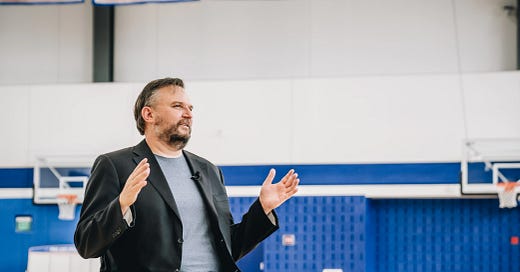What I learned from Daryl Morey
Daryl Morey is one of the most successful and most forward-thinking executives in all sports. As a GM of the Houston Rockets, he was one of the pioneers of the NBA analytics movement. Here are a few insights that characterize his work and thinking:
About Innovation:
You always have to keep innovating. Don't worry too much about the first idea. It doesn't have to be perfect. Just start and iterate from there. "You don't start if you smother the baby in the crib."
Create a combative culture. You don't learn anything until two people - who thought deeply about a topic - come to a different answer. Put your people into an environment where they are comfortable disagreeing with you.
Be open and willing to constantly change your mind. You want passionate, smart people with strong opinions although weakly held. Meaning, if they hear something better, they will quickly shift.
Show awareness and reflect on shortcomings. Scouts have to be fallible. This means showing awareness that they are seeking answers to questions with no certain answers.
When things go wrong, go back to first principles. Break down complicated problems into basic elements. Then reassemble them from the ground up.
About Cognitive Biases:
Don’t trust your intuition. Morey’s job is about constant decision making. But he never simply goes with his first thought. He knows his own mind well enough to mistrust it. Science shows that objective analysis leads to better decisions.
Always fight your cognitive biases. Simply knowing about a bias isn't sufficient to overcome it. Your mind needs to be in a constant state of defense against everything trying to mislead you.
Use the "Monte McNair-rule" to get rid of the endowment effect. Reverse trades in your head when you’re first thinking about them. If you were holding the other side of the deal - would you make the trade?
About goals and winning:
Always know your goal. Every decision you make must contribute to your goal. Ask the right questions. If your goal is to win a title: By how much will each player increase the odds of winning relative to what you pay them?
To achieve your goal, study history. Figure out what has worked in the past. To win a title, history says you have to feature a top-10 player, likely two. There are exceptions but exceptions are long shots. Focus on what gives you the best shot.
The 5%-rule: Very few teams every year even have a 5 percent chance to win the title. If you’re one of these teams, you’ve gotta be focused entirely on winning the title.
If you play a better opponent, go for high variance. If you just play your normal game, you're just going to get ground down. You have to play perfectly well and slightly different. You want randomness to have a chance.
About the use of data:
Information with real power comes in many forms. Everyone seeks predictive power. But it's not only about databases and models. It's also about the expertise/experience acquired via playing/coaching the game. The best organizations bring that all together.
Data forces you to ask the right questions. Scouts have patterns of players that succeed. Data serves as the counterpart. If they come to different conclusions, you ask: Why is this player ranked high by scouts but low by the model? Data makes your decisions more precise
There are two ways to get an edge with data:
a. You have better analysts
b. You have differential data
Differential data is clearly the better - but more difficult - option.
About Personal Growth:
Opportunity is not a lengthy visitor. You can do all the preparation. But at the key moments in your life, you have to know when to jump on opportunities. Not half. You have to put yourself fully into it. Always be ready to jump on the next big thing.

